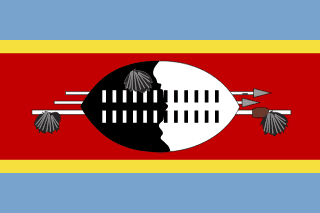Eswatini - Government

Based on the etymolgy of Eswatini, it was the country name derives from 19th century King MSWATI II, under whose rule Swati territory was expanded and unified. The Government system in this country is the absolute monarchy type and the different Administrative divisions includes: 4 regions; Hhohho, Lubombo, Manzini, Shiselweni
National symbols
Lion, elephant.
The flag
The National flag of Eswatini has .
Info
The National Anthem
| Title | |
|---|---|
| Lyric/music |
Info
More about the government of Eswatini
| Date of Independence | 6 September 1968 (from the UK) |
|---|---|
| National holiday | Independence Day (Somhlolo Day), 6 September (1968) |
| Legal system | mixed system of civil, common, and customary law |
| International law organization participation | accepts compulsory ICJ jurisdiction with reservations; non-party state to the ICCt |
| Constitution | |
| History | Previous 1968, 1978; latest signed by the king 26 July 2005, effective 8 February 2006 |
| Amendment process | Proposed at a joint sitting of both houses of Parliament; passage requires majority vote by both houses and/or majority vote in a referendum, and assent of the king; passage of amendments affecting "specially entrenched" constitutional provisions requires at least three-fourths majority vote by both houses, passage by simple majority vote in a referendum, and assent of the king; passage of "entrenched" provisions requires at least two-thirds majority vote of both houses, passage in a referendum, and assent of the king |
| Citizenship | |
| Citizenship by birth | no |
| Citizenship by descent only | both parents must be citizens of Eswatini |
| Dual citizenship recognized | no |
| Residency requirement for naturalization | 5 years |
| Executive Branch | |
| Chief of state | King MSWATI III (since 25 April 1986) |
| Head of government | Prime Minister Russell DLAMINI (since 6 November 2023) |
| Cabinet | Cabinet recommended by the prime minister, confirmed by the monarch; at least one-half of the cabinet membership must be appointed from among elected members of the House of Assembly |
| Election/appointment process | the monarchy is hereditary; prime minister appointed by the monarch from among members of the House of Assembly |
| Legislative branch | |
| Legislature name | Parliament (Libandla) |
| Legislative structure | Bicameral |
| Judicial branch | |
| Highest court(s) | Supreme Court (consists of the chief justice and at least 4 justices) and the High Court (consists of the chief justice ex officio and 4 justices) |
| Judge selection and term of office | Justices of the Supreme Court and High Court appointed by the monarch on the advice of the Judicial Service Commission (JSC), a judicial advisory body consisting of the Supreme Court Chief Justice, 4 members appointed by the monarch, and the chairman of the Civil Service Commission; justices of both courts eligible for retirement at age 65 with mandatory retirement at age 75 |
| Subordinate courts | Magistrates' courts; National Swazi Courts for administering customary/traditional laws (jurisdiction restricted to customary law for Swazi citizens) |
| Diplomatic representation in the US | |
| Chief of mission | Ambassador Kennedy Fitzgerald GROENING (7 June 2022) |
| Chancery | 1712 New Hampshire Avenue NW, Washington, DC 20009 |
| Telephone | [1] (202) 234-5002 |
| FAX | [1] (202) 234-8254 |
| Email address and website | [email protected] |
| Diplomatic representation from the US | |
| Chief of mission | Ambassador (vacant) Chargé d’Affaires Marc WEINSTOCK (since August 2025) |
| Embassy | Corner of MR 103 and Cultural Center Drive, Ezulwini, P.O. Box D202, The Gables, H106 |
| Mailing address | 2350 Mbabane Place, Washington DC 20521-2350 |
| Telephone | (268) 2417-9000 |
| FAX | [268] 2416-3344 |
| Email address and website | [email protected] Homepage - U.S. Embassy in Eswatini (usembassy.gov) |
Key Political parties and their leaders in Eswatini
Info
International organization participation
All Important Facts about Eswatini
Want to know more about Eswatini? Check all different factbooks for Eswatini below.









